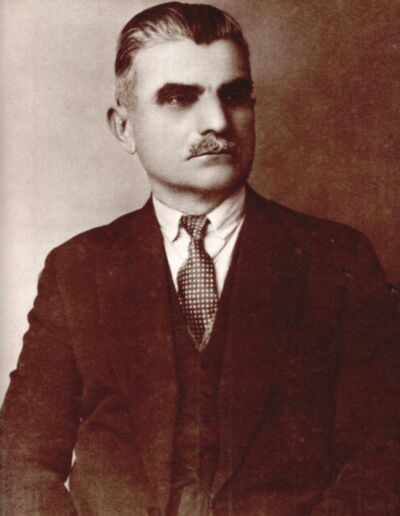The directory «Plots»
Asdreni (pseudonym of Aleks Stavre Drenova)
(1872—1947)

Asdreni was born in the village of Drenova, about five kilometers from Korça in southeastern Albania. He attended a Greek-language elementary school in his native village and had just begun high school in Korça when his widowed father died, leaving the thirteen-year-old Aleks an orphan. In the autumn of 1885, the young Aleks arrived in Bucharest (Romania) to join his two elder brothers. It was here in the culturally active Albanian colony that he first came into contact with the ideas and ideals of the nationalist movement in exile. Asdreni worked initially as a coal-boy and an apprentice, and later continued his studies, both privately, and for a short time at the Faculty of Political Science of the University of Bucharest. In 1905, he taught at an Albanian school in the port city of Constanza and the following year became president of the new Bucharest chapter of the Dija (Knowledge) society , originally founded in Vienna. Inspired by the creation of an independent Albanian state, he set off for Durrës on the Adriatic in the spring of 1914 to welcome the country’s newly chosen head of state, Prince Wilhelm zu Wied (1876-1945) , from whom he hoped to obtain an appointment as archivist in the new royal administration. It soon became apparent, however, that there would be little to administer and no need for his services at all. After a short visit to Shkodra, Asdreni returned to Bucharest in July 1914 as Europe prepared for war. In the following years, Asdreni continued to take an active interest in the Albanian national movement. He chose nonetheless to remain in Romania, and served there as secretary at the Albanian consulate which opened in March 1922. He made another visit to Albania in November 1937 on the twenty-fifth anniversary of independence, hoping after many years of service to the Albanian state to receive a government pension, but to no avail. He died in poverty on 11 December 1947 at the age of seventy-five.
It was in the early years of the twentieth century that Asdreni had begun writing poetry and publishing articles in the local press. In 1904, he published his first collection of ninety-nine poems, Rézé djélli, Bucharest 1904 (Sunbeams), which he dedicated to the Albanian national hero Scanderbeg . Asdreni’s second volume Endra e lote, Bucharest 1912 (Dreams and tears), published eight years later, displayed much greater maturity. This collection of ninety-nine poems, like the previous one, was divided into the cycles: fatherland, nature, thought and beauty, and was dedicated to the English traveller and friend of Albania, Edith Durham (1863-1944). The improvement in form, style and technique and the broadening of the range of themes and ideas are even more evident in Asdreni’s third volume of verse, Psallme murgu, Bucharest 1930 (Psalms of a monk), which marks the zenith of his poetic creativity. Many consider the collection Psallme murgu with its classical refinement to be one of the best volumes of Albanian verse published in the 20th century.
Albania, 1987, Aleks Stavre Drenova